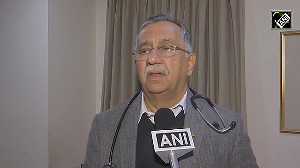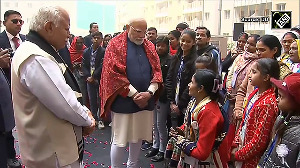Amid a tussle with the Aam Aadmi Party government, Punjab Governor Banwarilal Purohit on Monday told the Supreme Court that he has summoned the assembly for the budget session on March 3 even as the top court told both sides that constitutional discourse has to be conducted with a sense of decorum and mature statesmanship.

Stressing that the governor and the chief minister are constitutional functionaries with specified roles and obligations earmarked by the Constitution, the apex court observed that there was a dereliction of constitutional duty by both.
Not furnishing the information sought by the governor would be a dereliction of the chief minister's constitutional duty which would allow the governor to not do his constitutional duty to summon the budget session, it said.
The court also said there was no occasion for the Punjab governor to seek legal advice on whether to convene a Budget session as he is bound by the aid and advice of ministers.
The court, which was hearing the state government's plea against the governor's alleged "refusal" to summon the Budget session for March 3, said the Punjab government is duty-bound to furnish information as sought by the governor and at the same time the governor is also duty-bound to accept the recommendations of Cabinet on the convening of assembly.
A bench headed by Chief Justice DY Chandrachud, at the outset, took note of the submission of solicitor general Tushar Mehta, appearing for the governor, that the plea filed by the Punjab government does not survive in view of the governor's decision to convene the Assembly
"While this court is cognisant of free speech and expression, constitutional discourse has to be conducted with a sense of decorum and mature statesmanship, particularly in the context of constitutional dialogue between functionaries.
"Political differences in a democratical polity are acceptable and have to be worked out with sobriety. Unless these principles were borne in mind, the effective implementation of constitutional values is liable to be placed in jeopardy," the bench, also comprising Justice PS Narasimha, said.
Senior advocate A M Singhvi, appearing for the Punjab government, alleged that the governor was hijacking the Constitution.
"A constitutional authority is acting in ignorance of the Constitution. He is hijacking the Constitution," Singhvi said.
The senior lawyer said the governor is supposed to function as per the Constitution and if he goes by discretion, a budget session would not be convened.
"Is this the way the governor is supposed to act?" Singhvi asked.
Mehta told the apex court that the plea filed by the Punjab government has become infructuous and will not survive.
"The governor never refused and he said he is taking legal advice," he said.
"Look at the level of discourse. Street-level language is used!", Mehta said after reading out Mann's reply to the governor's letter.
The top court then remarked that there must be a certain constitutional discourse and there is a dereliction from both sides.
The apex court took note of Mehta's submission and disposed of the Punjab government's plea.
The top court, however, said there are certain facets that must be highlighted by this court in the exercise of its constitutional duty.
It said there can be no manner of doubt that the authority entrusted to the governor to summon the house of the legislature of the state is to be exercised on aid and advice of counsel of ministers.
"This is not a constitutional power where a governor can exercise his own discretion. In the present case, the governor was not summoning the house but was advised by the council of ministers to convene a budget session at the behest of an elected government. Clearly, the governor was duty-bound to do so," the bench said.
The top court said while responding to the request by the council of ministers for the summoning of the house, a communication of the governor evidently refers to the cabinet decision.
"However, the governor adverted to the tweet of the CM and the letter dated February 14, 2023. He then stated that since both the tweet and letter were unconstitutional and derogatory-he would have to take legal advice on this issue.
"There was no occasion to seek legal advice on whether or not the budget session of the assembly should be convened," it said.
"The governor was clearly bound by the advice of the council of ministers. Both the governor and the chief minister are constitutional functionaries who have specified roles and obligations which are earmarked by the constitution."
"The governor has a right to seek information from the chief minister on matters relating to the administration of the state. Once such information is sought, the chief minister is clearly duty-bound to furnish it," it said.
The apex court said the tone and tenor of the tweet in the letter by the chief minister left much to be desired.
"Not furnishing the information sought by the governor would be in dereliction of his constitutional duty. Yet on the other hand, the dereliction of CM to do so would not allow the governor to not do his constitutional duty to summon budget session," it said.
The top court said the failure of constitutional authority to fulfil its obligation under the distinct provision of the Constitution would not be a justification for another to fulfill his distinct duty under Constitution.
"It is inconceivable that the budget session of the assembly would not be convened. We can only hope that mature constitutional statesmanship would ensure that such incidents do not occur in the future as much as we reiterate that constitutional functionaries must be deeply cognisant of the entrustment of public trust of the offices which they occupy," said the court.
"Public trust is intended to subserve the citizens so that affairs of the nation are conducted with a sense of maturity so as to accomplish objects of the Preamble," it said.
The top court earlier in the day agreed to hear the plea of the Punjab government as Singhvi requested for urgent hearing on Tuesday itself.
The tussle between Punjab Governor and Mann had worsened last week with Purohit indicating he is in no hurry to summon the assembly's budget session, and reminding the CM about his "derogatory" response to a letter from the Raj Bhavan.
In that February 13 letter, the governor had asked Mann to explain the process of selecting 36 government school principals for a training seminar held recently in Singapore, and raised other issues as well.
Mann had responded that he was only answerable to three crore Punjabis, not to a Centre-appointed governor and also questioned the Centre's criteria for appointing governors.
Purohit had called Mann's replies not only "patently unconstitutional but extremely derogatory" also, saying he was compelled to take legal advice.
Purohit's letter to CM Mann had come two days after the Punjab Cabinet decided to call the assembly session on March 3 and requested the governor to summon the House.
The governor had told Mann that he will take a call on summoning the budget session only after taking legal advice on the CM's response to the issues raised by him in an earlier letter.











 © 2025 Rediff.com -
© 2025 Rediff.com -